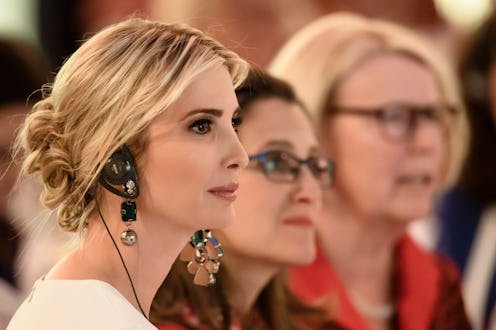News
The U.S. Isn't On The List Of Best Countries To Be A Working Woman

"I’m striving to think about how best to empower women in the economy," said Ivanka Trump at the W20 Summit in Berlin on Tuesday morning. The first daughter was there as part of a panel discussing women's entrepreneurship. "I grew up in a house where there was no barrier to what I could accomplish beyond my own perseverance and tenacity," she said in response to a question doubting her father's commitment to women's equality, adding that there was "no difference" between the way she and her brothers were treated growing up. But while that may have been Ivanka's experience as President Trump's daughter, it's no promise that her father will fight for all women in America. And Trump will certainly need to, because, according to a recent study by The Economist analyzing the best and worst countries in which to work as a woman, the U.S. ranks at number 20.
The study combines data on an array of different factors — including higher education, parental rights, childcare costs, salary, representation in senior-level jobs, and more — and calculates a weighted average from 0-100 (with 100 being the best possible score) for each country. Iceland sits pretty on top of the list, followed by Sweden, Norway, Finland, and Poland to round up the top five.
Among other findings, women in Iceland were estimated to attain a tertiary education at a rate 14.9 percent higher than men, though their of rate participation in the workforce was 4.8 percent lower. Icelandic women held 41.2 percent of managerial positions and 44 percent of board seats. Paid parental leave is provided to both mothers and fathers, with women receiving an average 16.6 weeks of paid leave and fathers getting roughly 8.3 weeks. But there is still progress to be made, even in the most equal country on the list — Icelandic women get paid 13.6 percent less than men.
The U.S. lags in several departments: no mandatory paid leave for mothers or fathers, a wage gap showing an 18.9 percent difference between men and women's pays, and only 19.2 percent of the seats in the House of Representatives being held by women. In stark contrast, nearly half of the Icelandic Parliament is made up of women.
Given President Trump's recent decision to revoke Obama's 2014 Fair Pay and Safe Workplaces policy, which aimed to protect workers from workplace discrimination, the chances of the U.S. reducing gender inequalities identified by The Economist's study don't look good.
At today's panel, the first daughter said she would bring the advice and knowledge she gained from the event "back to the United States, back to both my father and the president — and hopefully that will bring about incremental, positive change." Let's hope she learned something.